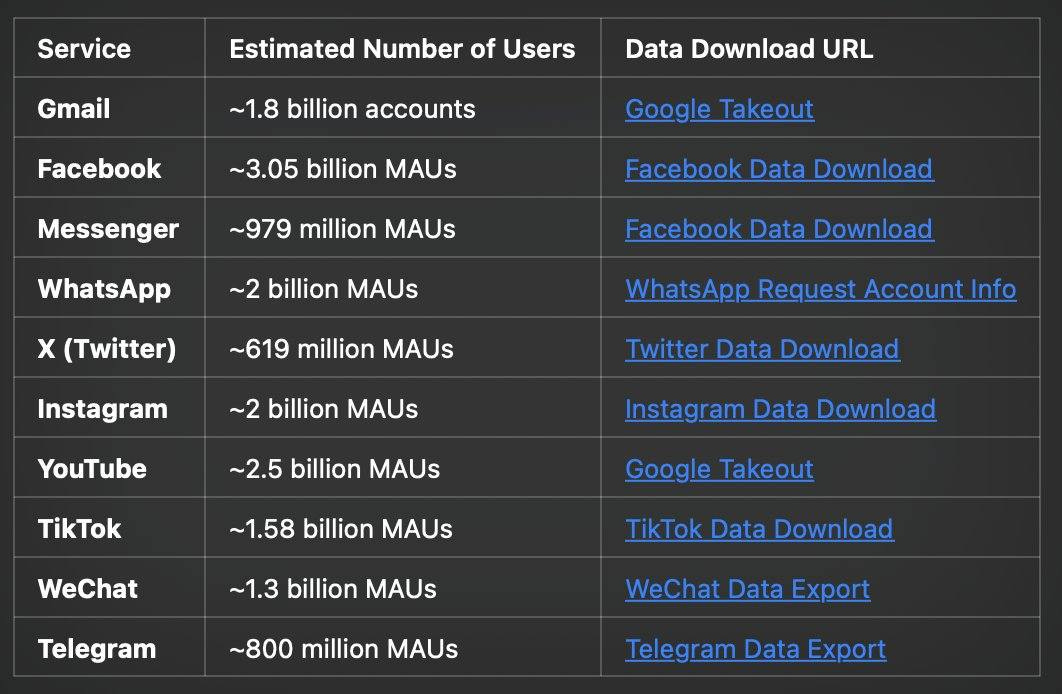We greatly enjoy the convenience of online platforms making our digital lives easier. Billions of people every day rely on products by Google, Meta, TikTok, and so many other providers, for their professional lives or just for entertainment.
Very few of us would want to go back and have the full responsibility of maintaining computer systems that are able to replicate what the cloud services today provide. Even those who have the skills to do so want to spend their time on productive tasks, rather than on system maintenance. Our use of online platforms will only increase in the future. However, this doesn't mean that we should feel completely beholden to them and trust them unconditionally.
The First Challenge: Backup Your Data
The easiest way to improve the balance of power consists in periodically exporting all of your data from every platform and storing them locally rather than in the cloud. This is indeed an essential maintenance task for your digital life that is worth executing if only just once a year.
This functionality is required by law in an increasing number of jurisdictions, such as the European Union or the state of California in the US. You should definitely expect every platform you use to have a reliable feature for exporting your data.
Here is a short list pointing to the data backup of some of the most popular platforms, current as of the time of this writing:
Can You Restore Your Data?
Having a backup that you cannot actually restore because maybe you didn't even try is worse than not ever having backed up, as it gives you a false sense of security, only to find out in the worst possible moment that you were wrong, and what you thought was a functional backup is something you actually can't use.
I realize that this may be too much for most of us. One reason is because even though the ease of use of the various data export features improved greatly over the years, the incentive largely stops after the backup has been created by the platform. They seldom provide the data in a format that is as user-friendly as the platform itself.
Here are just a couple of examples, and you may explore additional solutions as they hopefully get better over time.
Facebook: Exports data in a compressed folder containing HTML files. Once extracted, you can navigate your posts, photos, and even comments in a browser, offering a comprehensive view of your activity.
Gmail: Can export your data in the MBOX format, which you can open locally using an email client like Mozilla Thunderbird. This allows you granular access to each message, and Gmail’s labels are appropriately translated into folders in Thunderbird, preserving the message organization.
The Next Challenge: Our AI Interactions
As a good example of how this process is never-ending, you can already see the need to export your data from the various AI chatbot platforms that increasing number of us are using daily. OpenAI ChatGPT, and Anthropic Claud, and every other platform has to provide these tools, not only for legal reasons, but to strengthen their relationship with us.
We must be able to use AIs, knowing that while we enjoy their benefits, we are still free and do not excessively depend on them.




Very timely email. We just completed our annual audit. We do quarterly backups and annually we do a big purge of unneeded files. Many of us have become digital hoarders. I believe leaving so many personal data crumbs is a big security risk. This slow but mass exodus from Twitter is a reminder to not juat leave but reclaim digital autonomy and security. How many people won't officially purge and delete their Twitter accounts. Just abandon without disconnecting formally helpful app extensions.
Anyway, always thinking forward and asking the right questions!
Forgot that your newsletter is published through substack and that public remarks are more beneficial.